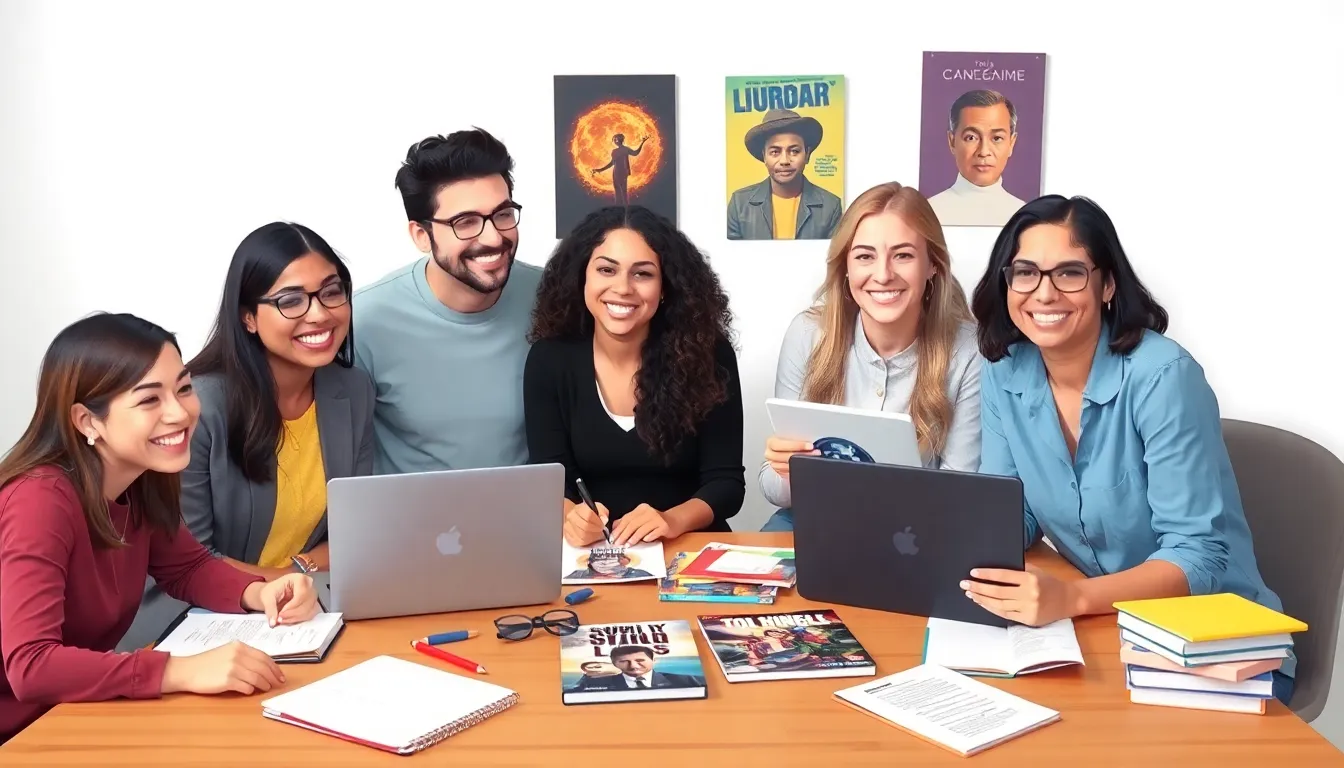Table of Contents
ToggleLearning a new language can feel like trying to juggle flaming swords while riding a unicycle. It’s exciting but also a bit terrifying. Yet, with the right motivation, anyone can transform this daunting task into a thrilling adventure. Whether you’re aiming to impress friends, travel the world, or finally understand that catchy foreign song stuck in your head, staying motivated is key.
Understanding Language Motivation
Motivation plays a crucial role in learning a new language. Different types of motivation can significantly impact the learning process.
Intrinsic vs. Extrinsic Motivation
Intrinsic motivation drives learners from within. They learn for personal satisfaction, curiosity, or the joy of mastering a new skill. This internal desire often leads to deeper engagement and retention. Extrinsic motivation, on the other hand, involves external factors. Rewards like job opportunities, social status, or accolades inspire learners. Both types contribute to successful language acquisition, but intrinsic motivation typically fosters a more sustainable interest over time.
The Role of Goals in Language Learning
Setting specific, measurable goals enhances focus and direction. Goals provide clear pathways for learners to track progress. For example, aiming to hold a 10-minute conversation in three months creates accountability. Short-term and long-term goals both play vital roles. Short-term goals offer immediate satisfaction, while long-term goals build toward a more comprehensive language command. Establishing goals leads to a more organized approach, improving motivation throughout the learning journey.
Effective Language Motivation Tips

Motivation plays a pivotal role in mastering a new language. Several strategies enhance motivation, leading to a more enjoyable learning journey.
Setting Achievable Goals
Achievable goals guide learners toward success. Setting specific milestones allows for clear focus. Short-term goals, like completing a lesson, provide immediate rewards. These goals create a sense of accomplishment. Long-term goals lead to greater achievements, such as fluent conversations. Breaking down these goals into smaller tasks makes them less daunting. Tracking progress offers visible proof of improvement, reinforcing motivation.
Finding Your Why
Understanding personal reasons for learning a language fuels motivation. Recognizing intrinsic motivators helps sustain interest. Engaging with the culture, like music or films, makes the learning process enjoyable. Connecting language skills to future aspirations, such as travel or career advancement, creates a more profound purpose. Reflecting on these reasons regularly sustains enthusiasm. Personal connections to the language transform challenges into exciting opportunities.
Creating a Positive Learning Environment
Creating a supportive environment is vital for language learning success. A positive atmosphere encourages persistence and enthusiasm.
Surrounding Yourself with the Language
Surrounding oneself with the target language immerses learners in its nuances. Listening to music, podcasts, and audiobooks fosters engagement. Reading books and articles ensures daily exposure to vocabulary and idiomatic expressions. Watching films or series in the target language enhances listening skills and cultural understanding. Frequent interaction with the language, even in small doses, reinforces retention and confidence. Engaging with different media sources creates a rich linguistic environment, helping learners internalize the language naturally.
Joining Language Learning Communities
Joining communities enhances motivation and builds connections. Language exchange partners and conversation groups provide real-life practice. Online forums and social media groups create space for sharing resources, tips, and experiences. Participating in local language clubs fosters accountability and friendship among learners. Collaborative study sessions allow individuals to learn from one another and boost confidence. Many communities also host events, workshops, and challenges that inspire members to stay committed to their language goals. Engaging with others makes learning more enjoyable and meaningful.
Incorporating Fun into Language Learning
Incorporating fun activities into language learning enhances motivation and engagement. Utilizing games and interactive apps transforms language study into an enjoyable experience.
Using Games and Apps
Language learning games and apps create exciting opportunities for practice and reinforcement. Platforms like Duolingo, Babbel, and Memrise offer gamified experiences, making vocabulary and grammar lessons enjoyable. Each game provides levels and rewards that encourage progress and competency. Social features on these apps connect learners, fostering friendly competition and accountability. Engaging with daily challenges keeps learners motivated while incorporating playful elements into their routine.
Engaging with Media in the Target Language
Accessing media in the target language exposes learners to cultural nuances and everyday conversation. Watching films, listening to music, or following podcasts facilitates immersive learning experiences. Selecting content that aligns with personal interests keeps engagement high and makes practice more enjoyable. Subtitled shows allow learners to follow along, reinforcing listening and reading skills. Interacting with songs encourages learners to sing along, improving pronunciation and vocabulary retention. Engaging with media consistently immerses learners in the language, paving the way for a deeper understanding and love for the language.
Tracking Your Progress
Tracking progress in language learning provides clear insights into achievements and areas for improvement. A few effective methods can enhance this aspect of the journey.
Keeping a Language Journal
Maintaining a language journal fosters reflection and accountability. Recording daily vocabulary, conversation practice, or comprehension notes helps retain knowledge. Entries can include new words learned, phrases practiced, or personal reflections on language challenges. Students often find revisiting past entries motivates further learning, reinforcing growth over time. This personal documentation creates a tangible record of progress, helping learners appreciate how far they’ve come.
Celebrating Small Achievements
Recognizing small achievements boosts motivation significantly. Celebrations can include acknowledging completed lessons or the successful use of new vocabulary in conversations. These moments of celebration provide a sense of accomplishment, fueling ongoing engagement. Short-term goals, such as reaching a certain number of study hours, can serve as milestones. Rewarding oneself for these achievements, be it through a favorite activity or a special treat, contributes to a positive learning experience. Regularly celebrating progress transforms the learning process into a more enjoyable journey.
Language learning is a rewarding journey filled with challenges and triumphs. By embracing motivation and setting clear goals, learners can transform their experience into something enjoyable and fulfilling. Engaging with the culture and utilizing innovative tools can further enhance this process, making each step toward fluency a celebration of progress.
Staying connected with others and celebrating achievements—no matter how small—can create a supportive environment that fosters growth. Ultimately, the key lies in discovering personal motivations and making the learning experience uniquely theirs. With the right mindset and resources, anyone can navigate the path to language mastery with confidence and enthusiasm.




